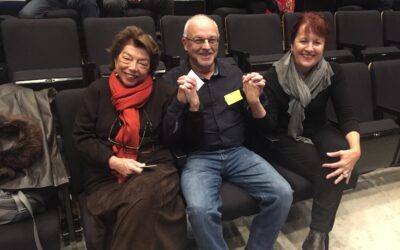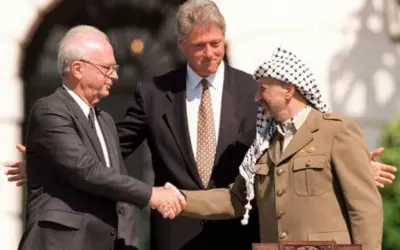A new poll shows a dramatic decline in support for the governing coalition as competing protests in Israel contribute to the chaos.
TEL AVIV — Some 200,000 people gathered in Jerusalem Thursday evening to protest the suspension of the government-led judicial overhaul, which critics contend amounts to a constitutional coup.
It was a strange rally: An elected government that enjoys a solid, stable parliamentary majority organized a mass protest against itself. Though the judicial reform has been the pet project of the Netanyahu government since coming into power, that same government decided March 27 to suspend the controversial reforms and begin talks with its opponents on a compromise.
Prime Minister Benjamin Netanyahu did not address the Jerusalem crowd. Instead, leading the protest were Netanyahu’s top hard-line government partners, including Justice Minister Yariv Levin, National Security Minister Itamar Ben-Gvir and Finance Minister Bezalel Smotrich.
The protest seemed timed to boost the stalled reform efforts just before the Knesset’s May 1 return from spring recess. Critics view it as a desperate last-ditch effort by the government to retake the country’s streets from the hundreds of thousands of pro-democracy protesters demonstrating throughout the country for the past four months. On Tuesday evening, while the national Independence Day ceremony was underway in Jerusalem, a mass alternative Independence Day party was held on Tel Aviv’s Kaplan Street, the hub of the pro-democracy protests.
Netanyahu’s coalition of right-wing, ultra-nationalist parties is now fighting back. Aides say the prime minister, who issued heartfelt thanks for the demonstrators’ turnout and support of his government’s reform plans, but did not attend the event, is torn. His emissaries are conducting negotiations with the opposition that have thus far made no real progress while Netanyahu is trying to project a conciliatory image as a consensual national leader while at the same time embracing his ultra-nationalist partners.
While Levin exhorted demonstrators to maintain their pressure on the government to wild applause, his speech also drew harsh criticism.
Levin specifically targeted feminist Labor Party leader Merav Michaeli “and her friends who dress up as slaves,” referring to the frequent imagery at the anti-government protests inspired by dystopian novel “The Handmaid’s Tale.”
“I call on you, join us so that we can have a court that punishes rapists rather than trying to make life easier for them, a court that cares about elderly women in south Tel Aviv and not about the infiltrators who harm them, a court that protects the lives of soldiers, not the neighbors of terrorists,” he said.
Levin’s predecessor Gideon Saar, who is now head of the opposition New Hope party, described the speech as egregious incitement against the judicial system Levin himself heads. Saar accused Levin of seeking to sabotage the government’s negotiations with the opposition and undermine the judicial system, saying, “He has proven unfit to hold office.”
Angry critics also pointed to imagery of demonstrators appearing to trample images of Chief Justice Esther Hayut and Attorney General Gali Baharav-Miara in footage reminiscent of flag-burning anti-Western demonstrators in Iran.
The sounds and sights from Thursday’s demonstration further angered lawmakers opposed to the compromise idea such as Yisrael Beitenu chair Avigdor Liberman and Michaeli, who has withdrawn from the talks. After the demonstration, both again called on centrist opposition leaders Benny Gantz and Yair Lapid to abandon the talks, arguing that the protesters had exposed the real intentions of the Netanyahu government.
Unlike other recent controversies, this current division does not pit left against right. The various coalition governments have adopted similar policies on issues of war and peace. Despite its hard-line rhetoric, Netanyahu’s current and previous governments have not retaken the Gaza Strip from Hamas, nor have they implemented the court-sanctioned evacuation of the West Bank Palestinian village of Khan al-Ahmar under strong pressure from the United States and European Union.
The current rift is between liberal democratic forces and an alliance of conservatives and nationalists, placing Netanyahu in a deeply uncomfortable position. A clear majority of Israelis advocate for democracy and reject any weakening. A poll published Thursday by Maariv shows another dramatic decline in support for the government coalition. Instead of the 64 Knesset seats it won in the Nov. 1 elections, the poll gives it only 50, an unprecedented collapse of support just four months into its term.
The poll shows Netanyahu’s Likud party losing close to a third of its power, plunging from 32 seats to 23, while Gantz’s National Unity alliance holds firm to its recent surge from 12 seats to 28, making it the biggest party in the 120-member legislature.
Netanyahu is well versed in deciphering poll results and must realize that this continued implosion, with mass protests against his anti-democratic legislation, spell his political demise. At the same time, his defense attorneys have put out feelers to the attorney general regarding a possible criminal arbitration process to replace Netanyahu’s ongoing corruption trial. He would surely prefer to replace this nightmare coalition with a broad-based national unity government and focus on resolving his legal woes in a dignified fashion. That goal currently seems unattainable. No one in the political arena seems to believe anything he says anymore.








